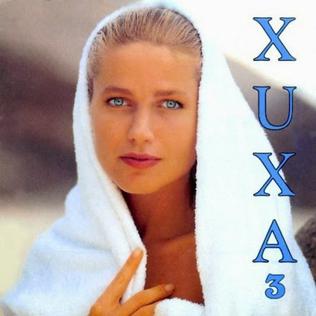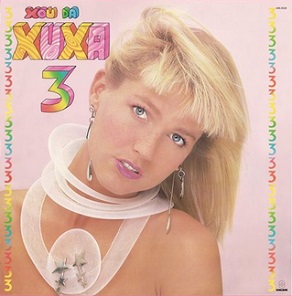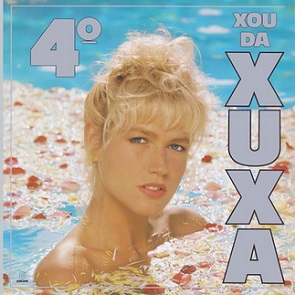
Maria da Graça Xuxa Meneghel is a Brazilian presenter, actress, singer, and businesswoman. Known as the "queen of the short ones", Xuxa built the largest Latin and Southern American children's entertainment empire. In the early 1990s, she presented television programs in Brazil, Argentina, Spain and the United States simultaneously, reaching around 100 million viewers daily. Xuxa has sold over 30 million copies of her records worldwide, which makes her the highest-selling Brazilian female singer. Her net worth was estimated at US$100 million in the early 1990s. Also successful as a businesswoman, she has the highest net worth of any Brazilian female entertainer, estimated at US$400 million.

This is the discography of Xuxa, a presenter, actress, singer and former model from Brazil. The singer has released twenty-eight studio albums, thirteen compilations, eight Spanish-language albums, over two hundred music videos and one hundred and ten singles. Xuxa became notorious after presenting the Clube da Criança program on the extinct Rede Manchete between 1984 and 1985, and soon after embarked on her first studio albums and soundtracks: Clube da Criança and Xuxa e Seus Amigos. However, it was with the albums of the Xou da Xuxa collection, which had significant sales that she achieved success.

Xuxa 2 is the eighth studio album and the second in Spanish language Brazilian recording artist Xuxa. The album was released on April 25, 1991, by BMG. The tracks did not undergo major changes, the instrumental sounded more pleasant and with a more Latin beat. The song "Crocki Crocki" is the only one that does not belong to the last two albums, but to Xegundo Xou da Xuxa (1987). The album was produced by Michael Sullivan and Paulo Massadas. The direction of the voice and the versions of the songs were made by Graciela Carballo.

Xuxa 3 is the tenth studio album and the third in Spanish language by Brazilian recording artist Xuxa. It was released in October 1992 in Latin America, United States and Europe.

Todos sus Éxitos is the fourth Spanish language album by Brazilian recording artist Xuxa. It was released in 1993.

Xou da Xuxa 3 is the fourth studio album by Brazilian recording artist Xuxa. It was released on June 30, 1988, by Som Livre. Xuxa' best-selling album, has sold over 5 million copies in Brazil, making it the best-selling brazilian albums of all time, as well as the best-selling album by a female artist in the country.

Xegundo Xou da Xuxa is the third studio album by Brazilian recording artist Xuxa Meneghel, released on June 23, 1987 by Som Livre. The album sold over 2 million copies. It is one of the most popular albums of Xuxa's career, surpassing sales in the previous album Xou da Xuxa (1986).

4º Xou da Xuxa is the fifth studio album by Brazilian recording artist Xuxa Meneghel, released on 11 July 1989. This LP was the fourth album of the collection Xou da Xuxa of a total of seven.

Xou da Xuxa is the second studio album by Brazilian recording artist Xuxa. It was released on 30 June 1986 by Som Livre, along with her television show in Globo.

Xuxa 5 is the seventh studio album by Brazilian recording artist Xuxa Meneghel. It was released on August 1, 1990, by Som Livre. It was the fifth album in the series Xou de Xuxa. The best-known songs from this album are "Pinel Por Você", "Trem Fantasma" and mainly "Lua de Cristal". The album sold more than 1 million copies in Brazil.

Xou da Xuxa Seis is the ninth studio album by Brazilian recording artist Xuxa Meneghel, released on September 12, 1991, by Som Livre. This album was the sixth album in the "Xou da Xuxa" collection, which totals seven. In this album are included songs like "O Xou da Xuxa Começou", "Novo Planeta" and "Hoje é Dia de Folia". The album sold more than 1 million copies.

Xou da Xuxa Sete is the eleventh studio album by Brazilian recording artist Xuxa Meneghel. It was released on October 2, 1992, by Som Livre. It was the last album of the series Xuxa Show.

Xuxa was the twelfth studio album by Brazilian recording artist Xuxa Meneghel. It was released in July 1993 by Som Livre. The album is composed only of songs that were left out of their previous albums.

Xuxa 10 Anos is a commemorative album by Brazilian singer Xuxa Meneghel. It was released in several formats in 1996: CD, cassette tape and LP. Sold 500,000 copies and was 3× platinum. In addition to the album, a special program was shown by TV Globo in June 1996.

Xuxa só Para Baixinhos 3 - Country is the twenty-fifth studio album by Brazilian recording artist Xuxa, released on August 31, 2002, by Som Livre. It is the third album in the collection Só Para Baixinhos.
"Ilariê" is a song recorded by the Brazilian singer Xuxa, released on June 30, 1988 by Som Livre as the lead single from her fourth studio album, Xou da Xuxa 3 (1988). "Ilariê" debuted at the top of the Brazilian radio stations, reigning for 20 consecutive weeks.

Lua de Cristal is a song by Brazilian singer Xuxa. It was released on July 16, 1990, by Som Livre along with his seventh studio album. Written by Michael Sullivan and Paulo Massadas, Luna de Cristal is the theme song from the 1990 Tizuka Yamasaki film of the same name starring Xuxa.

Xuxa só Para Baixinhos 6 or Festa is the twenty-ninth studio album by Brazilian recording artist Xuxa, released on December 9, 2005, by Som Livre. It is the sixth album in the collection Só Para Baixinhos.

Xuxa só para Baixinhos 7 - Brincadeiras is the thirtieth studio album by Brazilian recording artist Xuxa, released on July 7, 2007, by Som Livre. It is the seventh album in the collection Só Para Baixinhos.

Xuxa só para Baixinhos 12 or É Para Dançar is the thirty-fifth studio album by Brazilian recording artist Xuxa Meneghel, released on June 29, 2013, by Sony Music. It is the twelfth album in the collection Só Para Baixinhos.



















